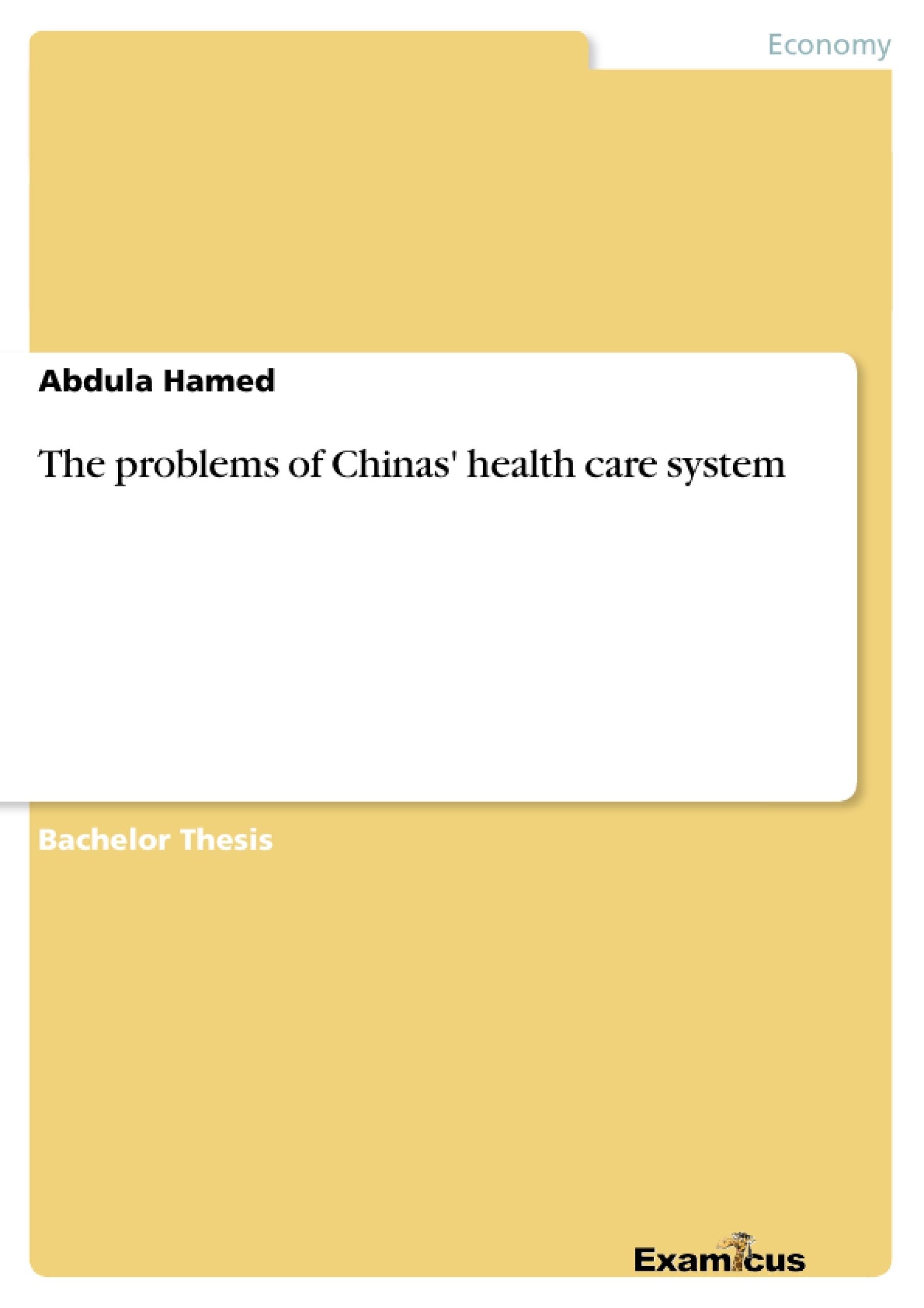Hinsichtlich vieler dramatischer Szenen im Gesundheitssektor Chinas und nach intensiver Recherche über die Problematiken des chinesischen Gesundheitssystems wuchs das Interesse, mehr über die Problematiken der Gesundheitsversorgung in China zu erfahren, um hierfür Lösungsansätze zu erörtern. Nach der Einführung der Reform- und Öffnungspolitik von Deng Xiaoping wird auf der ganzen Welt von Chinas atemberaubendem Aufstieg berichtet. Der Wandel zum liberalisierten Handel führte zu einem verminderten Armutslevel und festigt China an die spitze der weltweiten Wirtschaftsmacht. Es ist nicht zu leugnen, dass sich China in einer Ära, von noch nie da gewesener Empfänglichkeit hinsichtlich ausländischer Einflüsse, befindet. Neben den Vorteilen die die neue Reform mit sich gebracht hat, sind innerhalb des ehemaligen zentralisierten Krankensystems schwere Probleme aufgetreten. Trotz dem intensiven Engagement der Regierung gibt es zahlreiche Bevölkerungsgruppen die im Gesundheitssystem benachteiligt werden. Nicht nur die Einführung der Wirtschaftsreform ist für die Chinesen ein Segen, sondern auch die Verbesserung der Gesundheitsreform hat viel zum höheren Lebensstandard beigetragen. Anderseits hat der Reformwechsel im Gesundheitssystem Nachteile mit sich gebracht. Durch die höhere Qualität der medizinischen Versorgung, ist auch der Zugang aufgrund Preiszuschläge schwerer als je zuvor. In dieser Thesis wird das Fehlverhalten vieler Bauern hinsichtlich der Gesundheit und Krankheit dargestellt, als auch die Funktion des zu überteuerten Gesundheitssystems, das im Schatten des Einheitsstaates von der Regierung geführt wird. Des Weiteren werden Lösungs- und Verbesserungsvorschläge vorgestellt, die zu einer Verbesserung des Gesundheitssystems in China führen können.
Inhaltsverzeichnis (Table of Contents)
- Introduction
- China's healthcare organisation
- The development phase of the healthcare system
- China's healthcare system
- The health care financing system of China
- The healthcare insurance of China
- Basic medical insurance for urban workers
- Basic medical insurance for urban residents
- The rural cooperative medical care system
- The survey of University students' free medical care system
- Survey of children's medical insurance
- Survey of medical services for foreigners
- Refund of costs through the healthcare insurance
- The doctor choice and hospital choice behaviour in China's New Cooperative Medical System
- Main medical expenses reimbursement problems of the New Rural Cooperative Medical System
- Subsidies for severe disabilities
- Reasons for non- participation of farmers in the medical care system
- Reasons for the increasing poverty in the country-side
- Back into poverty due to illness
- The generally low cultural quality of the rural labour force
- The rural economic and social environment
- The relatively poor natural conditions in rural areas
- Problems in the supply of drugs
- Prevention of the circumvention of law
- Some Regulations of the Drug Control Law
- Relation between the doctor and patient
- Medical corruption
- Problems during the treatment
- Bail as a delay of the treatment
- Lack of Medical Knowledge of the farmers towards the pains
- Problems with the diagnosis of illnesses
- Hygiene problems
- Health and illness
- Understanding under "health and illness" of the World Health Organization
- Understanding under "health and illness" of the farmers
- Misbehaviour of farmers concerning health and illness
Zielsetzung und Themenschwerpunkte (Objectives and Key Themes)
This bachelor thesis aims to explore the problems within China's healthcare system, particularly focusing on the challenges faced by rural populations. It investigates the historical development of the system, analyzes the existing healthcare financing and insurance mechanisms, and examines the factors contributing to healthcare disparities.
- The historical development and current state of China's healthcare system.
- The challenges of healthcare financing and insurance in China, especially in rural areas.
- The impact of healthcare costs on poverty in rural China.
- Issues related to drug supply and medical corruption.
- The disparity in understanding of health and illness between healthcare professionals and rural populations.
Zusammenfassung der Kapitel (Chapter Summaries)
The introduction sets the stage by discussing the dramatic changes in China’s health sector following economic reforms. Subsequent chapters delve into the structure and financing of the Chinese healthcare system, outlining its different insurance schemes (urban workers, urban residents, rural cooperative medical care, etc.) and the challenges to their effectiveness. Further sections analyze reasons for increasing rural poverty, including the financial burden of illness, and explore problems with drug supply, doctor-patient relations, and diagnostic practices within the system. The analysis includes perspectives on the differing understandings of health and illness between healthcare professionals and rural populations.
Schlüsselwörter (Keywords)
China, healthcare system, healthcare financing, healthcare insurance, rural poverty, economic reforms, drug supply, medical corruption, doctor-patient relations, health disparities, rural health.
Frequently Asked Questions
What are the main problems with China's healthcare system?
The system faces issues like high costs for medical services, disparities between urban and rural areas, medical corruption, and a lack of access for the poor despite economic growth.
How does the healthcare system affect rural poverty in China?
Many farmers fall back into poverty due to high medical expenses ("illness-induced poverty"), as the insurance schemes often do not cover enough of the costs for severe diseases.
What is the "New Rural Cooperative Medical System"?
It is a healthcare insurance scheme designed for rural residents, but it faces problems with low reimbursement rates and complex procedures for choosing hospitals.
Are there issues with drug supply in China?
Yes, the thesis explores problems in the supply of drugs, including regulations of the Drug Control Law and the circumvention of laws by various actors.
How do rural farmers perceive health and illness?
There is often a lack of medical knowledge among farmers, leading to misbehavior concerning health and a different understanding of pain compared to WHO standards.
- Citation du texte
- Abdula Hamed (Auteur), 2009, The problems of Chinas' health care system, Munich, GRIN Verlag, https://www.grin.com/document/186698



